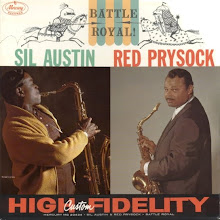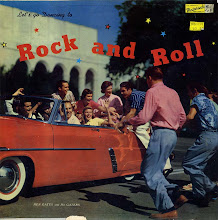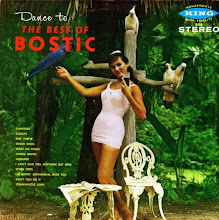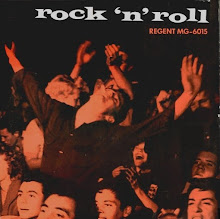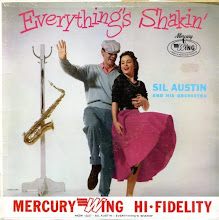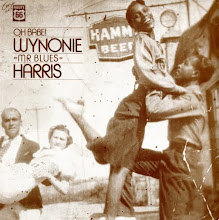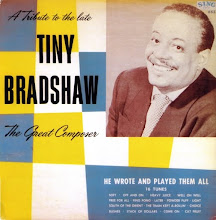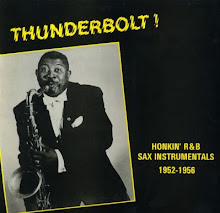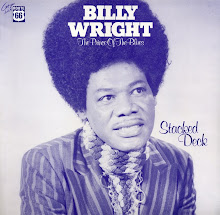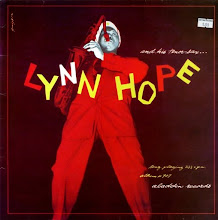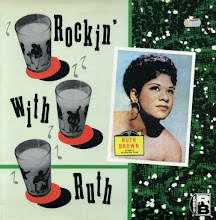Side One
1 Cecil Gant - Nashville Jumps
2 Cecil Gant - Loose As A Goose
3 Wynonie Harris - Lightning Struck The Poorhouse
4 Wynonie Harris - Dig This Boogie
5 Cecil Gant - Anna Mae
6 Rudy Greene - No Good Woman Blues
7 St. Louis Jimmy - Going Down Slow
8 Rudy Greene - Buzzard Pie
Side Two
1 B.B. King - I Got The Blues
2 B.B. King - Miss Martha King
3 B.B. King - Take A Swing With Me
4 B.B. King - When Your Baby Packs Up And Goes
5 Red Miller Trio - Nobility Boogie
6 Roosevelt Sykes - Candy Man Blues
7 Little Eddie - My Baby Left Me
8 Guitar Slim - Certainly All
The Bullet record label of Nashville, Tennessee was founded in early 1946 by Jim Bulleit, Wally Fowler and C.V. Hitchcock. There is an interesting article about the fascinatingly restless Jim Bulleit, on the website of the
Illinois Wesleyan University Magazine. Bullet Records recorded blues, hillbilly, gospel and pop, achieving its biggest hit in August 1947 with "Near You" a big band swinger by Nashville bandleader Francis Craig which reached number one in the Billboard pop charts. However, the label overextended itself by investing too much capital in the search for a similar hit and by 1949 was mired in financial trouble. Jim Bulleit sold out his share to Hitchcock but maintained involvement in the music industry via other enterprises such as his J-B label. He encouraged Sam Phillips to set up Sun Records in Memphis and was an investor in that label.
Bullet Records continued to issue material until around 1952 when it finally succumbed to its financial woes. The biggest R&B hit on the label was "Bewildered" by The Red Miller Trio and the biggest country hit was probably "Rag Mop" by Johnny Lee Wills. This 1983 LP on the UK Krazy Kat label gathers together some of the R&B / Blues output of Bullet, and it proves to be an eclectic and at times surprising mix. The earliest blues sides on Bullet featured two artists who were already established stars.
Nashville native Cecil Gant had a huge hit on the West Coast in 1945 with the sentimental wartime ballad "I Wonder." Recorded in 1944 in Los Angeles for the Gilt-Edge label, "I Wonder" is often credited with initiating the California boom in what would one day be called Rhythm and Blues music. Gant recorded for Bullet from 1946 to 1949, with titles like "Nashville Jumps", "Boogie Woogie Baby", "Ninth Street Jive" and "Boozie Boogie" indicating where his true talent lay. In 1950 he recorded a pounding version of Wild Bill Moore's "We're Gonna Rock" for Decca. And then, less than a year later, he was dead.
Wynonie Harris had been doing a fair bit of label hopping since leaving the Lucky Millinder Orchestra following his big hit with the band, "Who Threw The Whiskey In the Well." In 1945 he recorded for Philo ("Around The Clock") and then Apollo (including "Young Man's Blues", "Playful Baby" and "Everybody's Boogie."). As 1945 turned to 1946 he recorded four sides for the Hamp-Tone label, including a two part version of "Hey! Ba-Ba-Re-Bop." Composer credits on that version went to Lionel Hampton and Curley Hamner but we all know the song originated with Big Jim Wynn, don't we, fellow winos?
In the spring of 1946 Harris was in residency at the Club Zanzibar in Nashville. His manager, Harold Oxley, made an agreement with Jim Bulleit for Harris to cut four sides for the new Bullet label, backing to be provided by the same musicians with whom he was appearing at the club, the Jimmie Jackson band out of Chicago. In the band was pianist, arranger and former Alabama territory band leader Sonny Blount, later to be known as Sun Ra. Blount left Alabama following a torrid time with the draft board as he had declared himself a conscientious objector. As the consequences had included a short prison term and a spell in a work camp followed by illness, a fresh start was in order. Now some years beforehand Blount had been transported to the planet Jupiter (in a dream, perhaps) but what with transport to the gas giant being rather unreliable he opted instead for the equally exotic destination of Chicago.
There in the Windy City the future Sun Ra hooked up with alto saxophonist Jimmie Jackson and some months later we find him making his recording debut with Wynonie "Mr Blues" Harris in Nashville and featuring prominently on "Dig This Boogie." The full story of the R&B background of Sun Ra can be found on
The Red Saunders Research Foundation website.
And there's another notable recording debut on this collection - the first ever sides cut by B.B. King. At the time of these recordings, made in mid-1949, King was a performer and deejay on the Memphis based "Mother Station of the Negroes" WDIA where he hustled Pep-Ti-Kon, a patent medicine with an alcohol content of 12% and rival to the better known Hadacol. By the time King recorded for Bullet, Jim Bulleit had left the company. One year after the release of "Miss Martha King", B.B. made his first recordings for the Bihari owned RPM label and his big breakthrough followed at the end of 1951 with the release of "3 O'clock Blues" on RPM 339.
"Nashville Jumps" is one of those LPs which lay unplayed on my record shelves for many years. The sound quality is rough (being mastered from rare 78s) and the performances are rather less sophisticated than the output of bigger labels such as King or Atlantic but as I've worked on this disc to produce a blog post, I've come to really like it.
The back cover has very informative notes by Colin Escott, Martin Hawkins and Hank Davis. The history of the Nashville independent recording scene can be read in Martin Hawkins' book "A Shot In The Dark: Making Records In Nashville, 1945 - 1955." (Vanderbilt University Press, 2006)
Download "Nashville Jumps" from here:
Nashville Jumps (Mega)
or from here:
Nashville Jumps (Zippy)
Tracks with approximate date of issue:
Cecil Gant - Nashville Jumps (Bullet 250 issued April 1946)
Cecil Gant - Loose As A Goose (Bullet 250 issued April 1946)
Wynonie Harris - Lightning Struck The Poorhouse (Bullet 251 issued April 1946)
Wynonie Harris - Dig This Boogie (Bullet 251 issued April 1946)
Cecil Gant - Anna Mae (Bullet 257 issued October 1946)
Rudy Greene - No Good Woman Blues (Bullet 261 issued November 1946)
St. Louis Jimmy - Going Down Slow (Bullet 270 issued April 1947)
Rudy Greene - Buzzard Pie (Bullet 266 issued March 1947)
B.B. King - I Got The Blues (Bullet 315 issued November 1949)
B.B. King - Miss Martha King (Bullet 309 issued July 1949)
B.B. King - Take A Swing With Me (Bullet 315 issued November 1949)
B.B. King - When Your Baby Packs Up And Goes (Bullet 309 issued July 1949)
Red Miller Trio - Nobility Boogie (Bullet 295 issued November 1948)
Roosevelt Sykes - Candy Man Blues (Bullet 319 issued November 1949)
Little Eddie - My Baby Left Me (Bullet 348 issued July 1951)
Guitar Slim - Certainly All (J-B 603 issued 1953)














































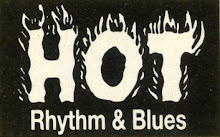
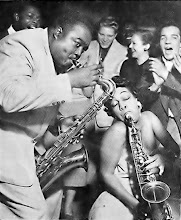




.jpg)




%2045%20-%201012A.png)














